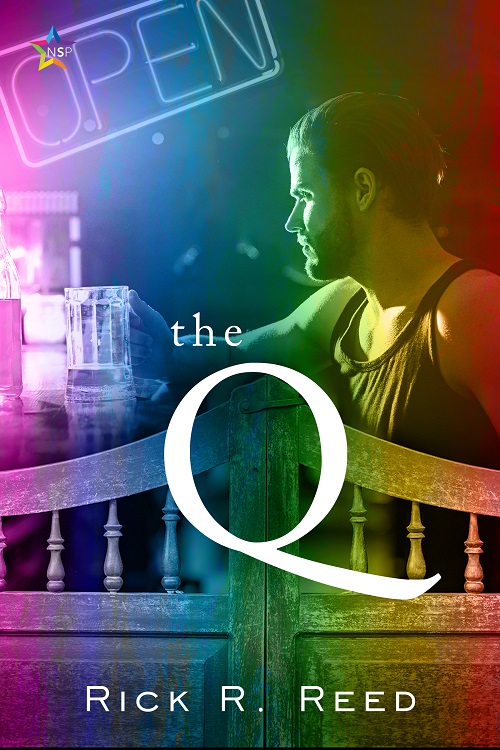
Genre: Contemporary, LGBTQIA+, Contemporary, Ace, Bi, Gay, Lesbian, Family drama, bartenders, blue collar, coming-of-age, coming out, hurt/comfort, soulmates, open relationship, #ownvoices, over 40, reunited
Add to Goodreads

About the Book
Step out for a Saturday night at The Q—the small town gay bar in Appalachia where the locals congregate. Whose secret love is revealed? What long-term relationship comes to a crossroad? What revelations come to light? The DJ mixes a soundtrack to inspire dancing, drinking, singing, and falling in (or out) of love.
This pivotal Saturday night at The Q is one its regulars will never forget. Lives irrevocably change. Laugh, shed a tear, and root for folks you’ll come to love and remember long after the last page.
Excerpt
The Q
Rick R. Reed © 2021
All Rights Reserved
Chapter One: Hey Bartender!
Mary Louise hated the term fag hag.
It was demoralizing, conjuring up an image of an older woman, heavyset, with too much makeup and hair that was too big. She would be sitting at home with her two cats, Will and Grace, drinking Cosmos alone and streaming Queer as Folk or Queer Eye while she waited for one of her gay male friends to call to shape and determine the extent of her social life. She’d maybe drink a little too much and laugh a little too loud. She’d play wingperson and watch wistfully from the sidelines as her cohorts paired off for an evening, a week, a month, or a lifetime. She’d tell her friends and family who’d never darkened the threshold of a gay bar that she liked going to them because she didn’t get hit on by predatory losers and she could let her hair down.
She knew the stereotype because for many years she’d been it—well, maybe not exactly, but close enough to make her cringe at the memory.
Sure, she still owned cats (or they her, far more likely), who were Siamese and not named Will and Grace, but Harry and Sally. Her hair had never been big and her idea of great TV was streaming the Golden Girls on Hulu. “Okay, so that’s a little gay,” she heard Sophia saying in the back of her mind. Her drinking taste leaned much more toward beer or a nice glass of whiskey, neat.
She’d broken free of being the wingwoman to the various gay men she befriended. She’d gotten rid of the idea that her happiness depended on a man, gay or otherwise.
She still laughed too loud and probably always would. One of her friends, Mort, delighted in acting out a scene with her from Who’s Afraid of Virginia Woolf when she let loose with one of her ear-splitting laughs. He’d accuse her of braying, and she’d respond, in her best Elizabeth Taylor, “I don’t bray,” and then command him to make her another gin and tonic. He always would comply and would sheepishly respond, “All right. You don’t bray.”
Mort had been gone since 1992, when AIDS took him at the tender age of twenty-eight. Mary Louise still missed him and kept a picture of the two of them, taken while on vacation in Provincetown, a year before Mort was diagnosed. She’d look at that photograph of the two of them, arms slung around each other on Commercial Street, and her eyes would well with tears, even though it had been close to thirty years since Mort had passed in an AIDS ward in a Pittsburgh hospital with only Mary Louise at his side. That loss still was tragic, not only because of Mort’s tender age, but because he was so alone. His partner, Nate, and his folks in Shippingport had abandoned him, the former claiming he couldn’t stand to see him this way and the latter voicing concerns that they might catch the virus. He was your son! She’d wanted to scream at the parents. He needed your arms around him. He needed you to see him. He was your lover! she’d say to Nate. His dying and death wasn’t about you and your fragile feelings.
Mary Louise hoped there was a special place in hell waiting for all three of them.
She’d watched many of her friends succumb to the virus before protease inhibitors came onto the scene, turning what was a death sentence into a somewhat manageable condition. She’d never stop mourning the loss of so many beautiful men.
When the fallout from all this was over, for all practical purposes, Mary Louise found herself bereft of friends. That’s when she decided to pack up and move back to her home town of Hopewell, where her mom and two sisters still lived. There was comfort in coming home to a place where her roots were deeply embedded, even if the area was blighted with poverty. It was still some of the most beautiful countryside Mary Louise could imagine.
Chicago had suddenly seemed too big and, at the same time, paradoxically empty. There were so many reminders—the Boystown strip along Halsted, the Baton Club on Clark, the Swedish restaurant Ann Sather next to the Belmont L stop—all of these places and so many more held more painful memories than she could count, even if they had the power to make her smile and laugh. She figured time and distance would transform the painful memories into joyous ones.
But each recollection of a night of drunken revelry out with her boys or a bleary-eyed brunch the morning after, were a hot touch to her grief, a pain that may have softened, but never went away. Mary Louise was grateful—she’d never willingly give up the hurt. She wanted to hold onto these memories of her boys forever. Despite the fact she was a bit of a stereotype and fit the fag hag profile pretty much to a T, the days and nights in Chicago with her circle of gay friends had been some of the happiest days of her life. And she didn’t even realize it at the time. Wasn’t that always the way?
Hopewell brought a sense of quiet, with its looming tree-covered hills—the foothills of the Appalachians and its position on a winding curve of the mud-brown Ohio River.
Moving back had simplified her life, even if it drained a lot of the bustle and color from it. In Chicago, she never walked alone; the streets, no matter the time of day or night, were always busy. In Hopewell, she could wander and never bump into anyone.
It was her mom, at eighty-six, who needed her help with things like shopping, cooking, running errands, and chauffeuring her to doctor’s appointments. Old Trudy, as she and her sisters referred to her behind her back, refused to move in with one of them, or God forbid, the assisted living facility up the road in Newell. Trudy always said, “I live alone because I like it. They say money is the root of all evil, but the truth is it’s people.”
Mom got by with her girls. And Mary Louise, even as she sometimes got nostalgic for the bright lights and hustle of the big city, knew she was doing the right thing. She’d experienced the Chicago skyline on a clear night, Lake Michigan’s blue/aqua/gray waves crashing against the shore, and the vast diversity of people living on its shore, and no one could ever take those memories away.
Even if she was feisty, clearheaded, and mobile, no one knew how much longer Mom would be with them.
At the Q, Mary Louise still could eye the boys, flirt with them, tease them, and play matchmaker in her role as bartender.
Right now, she stood behind the bar in a pair of unflattering black orthopedic shoes. Once upon a time, Mary Louise adored a pair of CFM (come-fuck-me) pumps with four-inch spikes. Oh, how great they made her legs look back in the day! Not that many noticed in hangouts like Sidetrack or Roscoe’s.
Now, midfifties, she needed to be comfortable when she was on her feet all night. Her smile depended on it, and thus her tips.
Currently, she waited for the doors to open, which would happen in about an hour. She was blissfully alone. Well, maybe blissful wasn’t the right word because all the lights were on as she prepped citrus and olives for drinks, washed glasses, polished the bar, and made sure the bottles behind it were stocked and ready to go.
The overhead lights cruelly stole most of the limited magic the Q possessed. And that was too bad. One of Mary Louise’s favorite characters was the tragic Blanche Dubois, from Tennessee Williams’s A Streetcar Named Desire and one of her favorite lines from the show was Blanche’s opinion that she didn’t want realism, she wanted magic. The shadows, soft lighting, and even the disco ball above the dance floor lent a kind of alchemy to the place, transforming it from run down to a setting where anything could happen, where hope lived.
Just before the doors opened, though, the joint looked tired and sad (as Mary Louise herself often felt). The cinder block walls, painted black, possessed a menacing air, like a dungeon—and not a fun one! The concrete floor, stained, showed its grit and the cracks that ran through it. Even the single long rectangle window at the front appeared dusty. Night pressed in on the tinted glass like a monster, hungry for admittance.
Stop it! Now you’re just getting crazy. Mary Louise finished her prep work and allowed herself a moment to sit on the stool she kept behind the bar. It might be her last chance for several hours to relax, if only for a few minutes. She dreaded the coming ache of her feet at evening’s end, orthopedic shoes or not.
But, oh, how she looked forward to seeing everyone! Every Saturday night was a party, and she was the hostess with the mostess.
Despite how some of the regulars could try her patience down to its last reserves, it brought her joy to watch the revelers, to serve them, to offer oblivion in a glass or a bottle. Even though her dancing days, mostly, were well behind her, she loved seeing everyone out there, bodies gyrating and spinning. Some were great, others awkward, others downright embarrassing, but to witness them cut loose after a long week was a thing of beauty, no matter their level of expertise or coordination. She especially loved some of the older patrons, who would bring their shakers of corn starch in to sprinkle on the floor, making it easier to slip and slide to the pulsing dance beat.
Gracie, Rose, and Liz were a lesbian trio that she particularly adored. Even though she’d never had much conversation with them, other than to take their drink orders, the three seemed so well-adjusted and happy, despite never once pairing off, as half the bar expected them to do. And Mary Louise, who considered herself a pretty astute observer of human nature, could tell from a mile away that Gracie was in love with Rose. So obvious! Why couldn’t Rose see it? Or did she simply not want to? Mary Louise had wondered if maybe they were a throuple, but everyone she talked to about that particular suspicion shot in down. “They’re best friends, that’s all.”
She turned as the door squeaked open. There stood Billy Breedlove, her barback and bouncer when needed (not often) in his usual garb—black combat boots, black cargo pants, and a black T-shirt that appeared to be painted on his beefy physique—looking worried.
Mary Louise was taken a little aback. For one, her breath always did a little catch in her throat when she saw him, accompanied by a skip of a heartbeat. He was a beautiful man with his muscles, his bleached-blond buzz cut, and the tattoo sleeves, wildly colorful butterflies and birds that ran down both arms. The fact that he was unattainable made him even more attractive.
And then she’d chide herself. That young man is a good twenty years younger than you, if not more. Cougar. Shame on you.
He’d once told her, when the doors were closed and the lights back on, as they concluded the evening’s business and everyone had headed home, that he was a volcel.
“What the hell’s that?” Mary Louise had asked, mystified.
“I’m an ace,” he’d said, only confusing her further.
“Voluntary celibate, asexual,” Billy told her. “I’m better off without the nasty, you know. I just don’t want it. It would be hard, no pun intended, if it didn’t work for me. But honestly, I never think about sex. Call me weird, but it works for me. And that’s all that matters.”
On hearing those words, she laughed, disbelieving. She fully expected him to laugh, too, maybe slug her in the arm for being gullible. When he didn’t join her in her laughter, her heart broke for him because she knew he wasn’t kidding. She’d pined with unrequited love for gay men most of her adult life and here was one who was most likely straight. And wouldn’t you know it? He’d sworn off sex.
The world was a hopeless place.
He’s too young for you anyway.
The second reason Mary Louise was taken aback was from the worry stamped on Billy’s face.
“There’s been an accident,” he called over. “It’s bad.”
“Oh no.” Mary Louise stood. “What happened?”
Purchase
NineStar Press | Books2Read



No comments:
Post a Comment
Note: Only a member of this blog may post a comment.